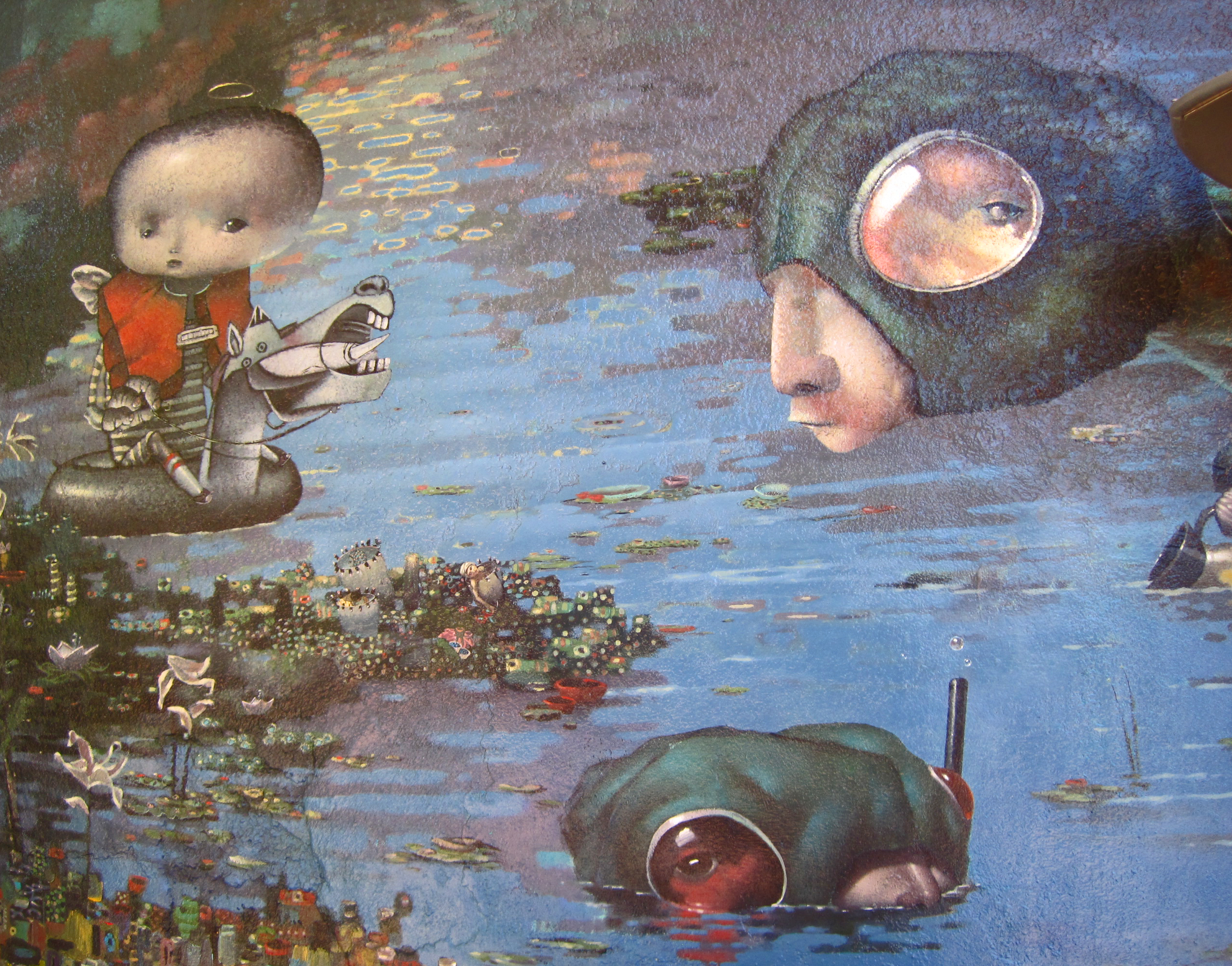
It seems so clear to me now how one does not find truth or peace or god. One lives these things.


..... and other entertaining fascinations

It seems so clear to me now how one does not find truth or peace or god. One lives these things.


Please do the world a favor. Stop calling free speech divisive. It is your political duty to speak freely. Free speech is, in fact, “indispensable to the discovery and spread of political truth.”
“Those who won our independence . . . believed that freedom to think as you will and to speak as you think are means indispensable to the discovery and spread of political truth; that without free speech and assembly, discussion would be futile; that with them, discussion affords ordinarily adequate protection against the dissemination of noxious doctrine; that the greatest menace to freedom is an inert people; that public discussion is a political duty; and that this should be a fundamental principle of the American government.” — Lewis, Anthony (2007); Freedom for the Thought That We Hate: ‘A Biography of the First Amendment.’
It’s curious to me that people are tending to confuse those of us who speak out on social media against anarchism, destruction of property, bullying, looting, destruction and the hypocrisy of the political left, as politically divisive. It seems that political correctness has tragically and permanently invaded the critical thinking process of most Americans.
It is astounding, really, how the Left has sent us into hiding simply on the grounds that their supposition that our freedom to speak openly leads to divisive and politically charged rhetoric. People are no longer able to stir up any passion within themselves to speak the truth in the face of deliberate fascist activities whose sole motives are to shut our freedoms down.
Some time ago now, in opposition to Milo Yiannopoulos’ scheduled speech on the UC-Berkeley campus, (he was never even allowed to speak), “violent left-wing protestors tore down barricades, lit fires, threw rocks, tore down light poles and threw Roman candles at the windows and breached the ground floor of the building” in protest against his mere presence on campus!! Police were called in to finally get the crowd under control.
If, in your lack of perception, you fail to see the seriousness of this ever increasing leftist agenda to silence free speech, which demonstrates virulent hatred at every opportunity, and you choose to say nothing anywhere against it for fear of being divisive or politically incorrect, please consider how obtuse your position is.
Against all rational understanding possessed by political conservatives, the political left was demonstrating against someone who is closer to their own ideology than anyone on the political right:
Yiannopoulos is an outspoken homosexual immigrant who is in a relationship with another (or possibly several) black homosexual(s); he is a Greek-born British journalist, author, entrepreneur, public speaker, and a technology editor for Breitbart News, a far-right news and opinion website based in the United States. It is insane that those on the political left were demonstrating against him simply because of his conservative views, including free speech! You would think they’d show up in droves to approve of his lifestyle.
Kirsten Powers, once a Fox News contributor and USA Today columnist, says of the recent and growing tactics that amount to political bullying in the extreme, that the progressive Left’s persistent attempts to shut down free speech reeks of arrogance and essentially says “we will destroy you for having the nerve to think you can actually exercise your free speech rights.”
Wake up people! If your freedom to discuss your position (without the rancor, hostility, and the typical hateful names incessantly chosen by those on the political left, i.e., “Islamaphobe, racist, white supremacist, priviledged, intolerance,” ad infinitum … ) is getting shut down for fear of offending someone, it’s time to do a reality check.
To those on the left, lying and dispelling misinformation, demonstrating for the purpose of destroying property and shutting down your Constitutional American privileges, is now fair game because the outcome is all that matters to them, not the means to the outcome.
Their false claims of superior morality are foolish. The examples of their proclivity to engage at this level are myriad, and they have demonstrated this continuously since Trump’s election on every front conceivable, and all during Obama’s administration. It is getting worse all the time. And now it’s time to abandon political correctness.
In order to even begin the discussion and stop the incessant hatred that the left espouses, we must recognize it, and confront the left with the reality of their basic untruthfulness and hypocrisy. Only then can any real hatred begin to be addressed and division stopped. Until that happens, the rioting, hatred and name calling will not stop. Only in the confrontation of the blatant hypocrisy and falsehood will we have a chance of really being heard.
Step up!! To say nothing for fear of “avoiding the confrontation because it might instigate more division,” is to be defeated by the hatred before the discussion about it can begin.
To avoid the discussion and the confrontation up front means that in the mindset of the left, they have won, when in fact they have only increased the division and hostility.
When I go to the mall and I see middle-class white kids (MCWK) talking, smoking, tattooing, dressing, sagging, thinking (well, maybe not thinking ...), and attempting to mimic (start naming any rapper), I think:
What is it about this whole 'rapper thing' that's appealing to the MCWK?? Why is their perception of the rap lifestyle so worthy of being glorified in their eyes? Then of course it doesn't take long to realize that's what we saw the MCWKs doing back in the 1980s; same problem then, different culture being emulated.
Rap reminds me of some wannabe societal drop-outs who seek to glorify themselves by pissing off whoever doesn't like rap. It's about trying to be 'King of the Mountain' in modern-day refuse dumps [where rats find different ways to steal each others trash]; it's about telling the story of being king where the only mountain to be king on is in a city that's mostly a refuse pile... and then coming up with lame lyrics to someone else's melody and changing the words to "Come on everybody, 'Let's Do This!'"
Except, in a weird way, rappers are playing for keeps! I might add that in general, the 'King of the Refuse Pile' message of rap music (hip-hop -- whatever the current morph is), is remarkably appealing to the kids who are clueless about that culture. And, I'm not sure what the attraction is to emulate a culture you are absolutely clueless about; except maybe to be the laughing stock of the culture you are emulating (in some strange karma world).
Being attracted to a culture one is clueless about reminds me of a similar message handed out to a MCWK audience at the first (and last) punk concert I ever attended. A rare moment in concert history, and indeed, one unlikely to be repeated. What happened that night, (an annal in punk history), was truly a once-in-a-lifetime event, and the fact that no MCWK saw the absurdity in it all truly transcends its fascination for me. (For a better understanding of the punk culture read my post here).
Enter the Gang of Four, The Buzzcocks and a few other punk bands (that in terms of popularity were essentially 'go-nowheres'). There we were in Anaheim, California (late 1980’s?) at a nice indoor arena to review a punk concert. The first 100 feet in front of the stage was the general-frenzy-pit-slamming-blood-bath-of-death-see-if-you-can-stay-alive area. [I would have gone down but I didn't want to hurt any of the kids. (Right!)].
Packed in front of the stage were myriads of MCWK ... AKA ‘teenagers.’ You know, “My daddy is President of P G and E; what does your daddy do?” “Oh, my daddy’s Vice Pres. of Continental Bank, etc.” All dressed up in their then MCWK clothes to see England's current touring punk band offerings.
The Gang of Four come out and start playing through a few songs. After a few minutes, you can tell the lead singer is somewhat distracted, but what from? After a while you realize (from back in the seats when the lights are at the right angle) what is distracting him. MCWKs in front of the stage are spitting huge honkers of snot and saliva at the lead singer. You can see it sort of flying through the colored lights at him. And I'm wondering, "Oh ...hey this looks like fun. Boy I wish I was up there on stage partaking of this fantasy. I wonder ... how long is this nonsense going to be tolerated?"
After 10 minutes of this saliva frenzy, in a fit of absolute rage, the lead singer stops playing guitar and singing and curses at the top of his lungs into the microphone. The rest of the group stops playing. The lead singer is incredulous about it now. All the front row MCWKs stop spitting as they stare in awestruck-wonder: Wow ... is it that they can't figure out why he's not into getting spit on?
"What? We can't participate?" they're undoubtedly thinking? “Doesn't he know about Sid Vicious?" "Isn't this a punk show?" "Isn't spitting what punk is all about?" And beautifully, poetically, majestically, the singer's rage building to a beautiful, artful, momentous rainbow of intellectual light, about to crescendo before their MCWK eyes ... (eyes that will never meet punk reality)! The guy slowly, painstakingly, meticulously goes into this acrid biting commentary about how stupid these MCWKs are because they've obviously missed everything about the "spitting" spectacle that made Sid so infamous because ... they can't get it.
Imagine: having to stop your punk show only to launch into a badly needed verbal spanking about the history of punk expectoration for a bunch of clueless teenagers … trying to help them to 'get it' in the middle of a song in the middle of a punk concert, in the middle of Middle Class Anaheim.
"Sid and the guys are trapped by their circumstances see," he tries explaining, "bound to follow their father's empty and meaningless life of working in the coal mines in England because there's nothing else anyone can do there because there's no way out except to work in the mines." (Sort of like trying to be King of the Refuse Mountain in downtown Detroit in a weird kind of other-universe Twilight Zone way).
"There's no other work. There's no money. You can't move away. Poor isn't the adjective they use to describe their circumstances .... desolate is. There's no hope for change. It's always been the same. It's one of those 'We're all gonna die, and we all know it it's pointless' scenarios, see? … it’s the pathetic wasted lives syndrome."
He goes on. "If your dad works in the coal mines, and you are his son, you are born to die in the coal mines. Should you live long enough and actually survive the hellish work in the mines, you'll die slowly and painfully from lung cancer for sure."
Only then does he unleash his poignant commentary about the spitting. “And so, you freaking sh%*heads, the spitting thing, is a commentary on the degrading environment and circumstances that desolate punks can't get away from. Spitting is merely a self-prophesying commentary about the tragic life we are stuck in. Spitting represents our deplorable situation. It helps ease the total desperation. And seeing as how none of you fu*king idiots are in that situation, why are you brainless snobs spitting? WHY? You couldn't be more
clueless! You have every opportunity for success and wealth handed to you from the day you were born. You couldn’t begin to get a freaking clue about the spitting!"
And as he walks off the stage shaking his head in absolute disgust, the band follows him and they’re completely done dealing with the spitting spectacle. (I can just see the headlines now in the London Times: "Punk artist walks off stage mid-concert during first world tour only to return to kick teen in the teeth for spitting on him!"). And I'm watching this with my friend and I'm asking him, "Did you just see what happened up there?” And he's saying, "Wow! That was amazing." And I said, "Can you believe what he just said?" And he said, "It's too much satire on a pathetic situation. Do you think they'll get it?"
A few minutes later The Buzzcocks come on stage and start playing, and right away, you could see the honkers of snot flying through the colored lights at the lead singer.
And tomorrow when I go to the mall, they're gonna be there all dressed up like rap stars too! And it's just gonna be another day when another valuable life lesson goes down the tubes ... ignored by all. Uh--hu
So we're vacationing in Arizona for a week or so, and visiting the big spots: Wickenberg, Gilbert (not so big really but where ...